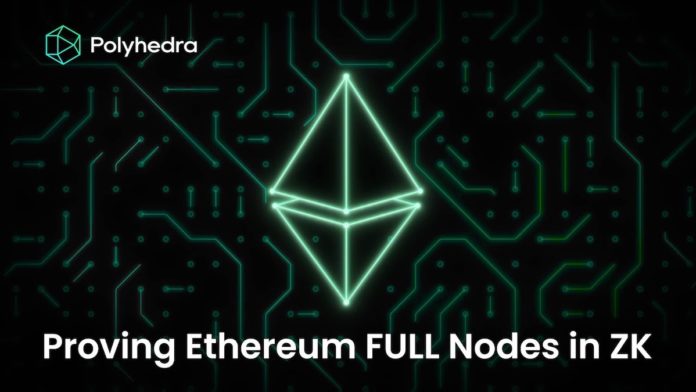Compared to Ethereum light clients, the approach of proving Ethereum full nodes has much higher security guarantee. Ethereum light clients operate on a distinct algorithm, and their security relies entirely on a committee known as the “sync committee.” However, the sync committee’s size is merely 512, rotating roughly daily (i.e., about 27.3 hours). The total staked assets amount to as few as 16384 ETH (calculated as 512 * 32), a figure quite negligible in comparison to the daily transactions volume on cross-chain bridges connecting Ethereum ecosystem with other networks.
Another issue is that the sync committee does not always sign the block. (e.g., block 17239413 and block 17239414). Statistics show that 1.6% blocks are not signed by the supermajority of the sync committee.
System overview for proving Ethereum full nodes
In order to rectify these issues, Polyhedra Network has decided to get rid of the sync committee and utilize the full PoS consensus of the Ethereum blockchain, which has been deployed since the merge. This will incorporate more than 20,000 signatures (a 40-fold increase from the 512 sync committee) within a single block on Ethereum mainnet.
To manage the 40-times increase in workload, Polyhedra Network has employed its unique proof system—deVirgo. This system boasts unrivaled processing capabilities, thanks to its theoretical enhancements and significant engineering advancements. deVirgo protocol theoretically eliminates the need for very large FFT or MSM, making the proof generation linear time to the number of signatures. The protocol has been deployed on zkBridge and supports parallel and distributed computation.
Experiments on the proof system with a billion-size circuit revealed a proof generation time of less than 10 seconds, which matches the pace of Ethereum block generation, without increasing the proof size or verification time.
Efficient proof system for proving Ethereum full nodes
To enable fast prover time for proving Ethereum full nodes, Polyhedra Network uses its efficient proof system, deVirgo. Devirgo is the distributed version of the Virgo protocol, and is designed to parallelize the GKR protocol by distributing the computation across multiple machines. With deVirgo, zkBridge can support swiftand flexible interoperability between different blockchains without relying on external trust assumptions. zkBridge also uses recursive proof to prove that the previously generated proof by deVirgo proves the corresponding block headers. The proof recursion reduces the on-chain verification cost to about 220K gas on any EVM-compatible blockchain network.`
The key insight of deVirgo is to explore the nature that the verification of Ethereum full consensus can be represented as a data-parallel circuit. Suppose there is a data-parallel arithmetic circuit 𝐶 as well as N machines. The deVirgo proof system can divide the data-parallel circuit into N sub-circuits, with each machine computing only one sub-circuit. Verification of Ethereum full consensus is such a data-parallel circuit, and it can contain more than 30k of identical signature verification algorithms and hashes.
Central to deVirgo is a technique to distribute the sumcheck. In deVirgo, the sumcheck protocol is divided into two phases. In Phase 1, each machine processes their own sub-circuit and collectively generates one aggregated proof. The remaining work will be small enough for a single machine, which executes Phase 2 that concludes the distributed sumcheck.
Performance evaluation for proving Ethereum full nodes
To evaluate the implementation on BLS signature aggregation, Polyhedra Network measured the running time of the deVirgo prover and recursive verifier using two AMD EPYC™ 7763 CPUs.
Polyhedra Network has deployed Ethereum full-nodeproof system on zkBridge. zkBridge sets Ethereum as the sender chain, and other networks such as BNB Chain and Avalanche as the receiver chain. The result shows that zkBridge can generate the Ethereum full-node proofs and verify the block header on BNB Chain and other networks within 12 seconds including the delays of all the components.
Polyhedra Network will continue optimizing the implementation. GPU acceleration is planned in the near future, which can lower the up-front cost for better decentralization. Nevertheless the current zkBridge proof system is efficient enough to catch up with the block time of Ethereum.
Concluding remarks
Through the implementation of proving the Ethereum full nodes, Polyhedra Network enables fully trustless, efficient, and secure interoperability using zkBridge, to connect Ethereum ecosystems (both L1 and L2s) with other networks.
zkBridge is the first trustless, efficient, secure, and universal cross-chain bridge with advanced zero-knowledge proof technology. zkBridge uses zero-knowledge proofs to efficiently convince the receiver chain that a certain state transition happened on the sender chain. With zero-knowledge proofs, zkBridge offers both strong security and a significant reduction in on-chain verification cost, without relying on external assumptions.
Furthermore, zkBridge also allows transmission of current and historical Ethereum data, including the blockheader and transaction data, to be accessible by any other blockchain ecosystems and applications. This will enable any smart contract on any blockchain to trustlessly access Ethereum data and compute on top of the Ethereum data. All the security will be guaranteed by proving Ethereum PoS full nodes by using the efficient proof system of zkBridge.


